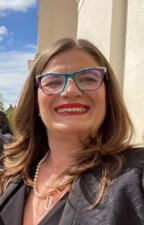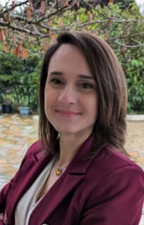
EuMIC Plenary Session Details
Andreia Cathelin, Technical Director Advanced R&D Design and Technology R&D Fellow, STMicroelectronics, Crolles, France
Abstract
This talk will bring the distinguished audience into the IoT land, presenting first the application fields, and then the integration challenges. We will then discuss about the FD-SOI CMOS technologies, and how their particular features permit to tend towards the best-in-class energy efficiency and life time for such products, thanks to this technology opportunity. Sustainability aspects and implications will as well be discussed. We will demonstrate that technologists and IC designers can and should contribute to an overall carbon neutrality aspect over three axes: enable technologies that are energy-aware by construction, act for a system level global energy aware strategy and bring in circuit design solutions that always show 10x better energy reduction.
 Andreia Cathelin (M’04, SM’11) started electrical engineering studies at the Polytechnic Institute of Bucarest, Romania and graduated with MS from the Institut Supérieur d’Electronique du Nord (ISEN), Lille, France in 1994. In 1998 and 2013 respectively, she received PhD and “habilitation à diriger des recherches” (French highest academic degree) from the Université de Lille 1, France.
Andreia Cathelin (M’04, SM’11) started electrical engineering studies at the Polytechnic Institute of Bucarest, Romania and graduated with MS from the Institut Supérieur d’Electronique du Nord (ISEN), Lille, France in 1994. In 1998 and 2013 respectively, she received PhD and “habilitation à diriger des recherches” (French highest academic degree) from the Université de Lille 1, France.
Since 1998, she has been with STMicroelectronics, Crolles, France, now Advanced R&D Design Technical Director and Technology R&D Fellow. Her focus areas are in the design of RF/mmW/THz and ultra-low-power circuits and systems. She is currently leading the RF Affinity team transversal inside the company, which enables knowledge creation and breakthrough solutions in the field towards open innovation and business impact.
Andreia is very active in the IEEE community since more than 15 years, strongly implied with SSCS and its Adcom (2 terms up to 2022). She is a member of the VLSI Symposium Executive Committee and has been the TPC chair of ESSCIRC 2020 and 2021 in Grenoble, and General Co-Chair of ESSCIRC-ESSDERC 2023 in Lisbon. She is as well IEEE RFIC Symposium TPC member and has been for 10 years involved with ISSCC as RF subcommittee chair and then member of the Executive Committee. She is as well an active founding member of the IEEE SSCS Women in Circuits group.
Andreia has authored or co-authored 150+ technical papers and 14 book chapters, has co-edited the Springer book “The Fourth Terminal, Benefits of Body-Biasing Techniques for FDSOI Circuits and Systems” and has filed more than 40 patents. She is currently Associate Editor for T-MTT, TCAS-I and OJ-SSCS IEEE journals.
Andreia has been a recipient and co-recipient of several awards with ISSCC and RFIC. She is as well the winner of the 2012 STMicroelectronics Technology Council Innovation Prize, and has been awarded an Honorary Doctorate from the University of Lund, Sweden, promotion of 2020.
Closing
Valeria Di Giacome-Brunel, United Monolithic Semiconductors (UMS)
 Valeria Di Giacomo Brunel is at the head of Foundry Services in UMS (United Monolithic Semiconductors). She joined UMS in 2011 as modelling engineer and she covered later the position of project manager for technology development.
Valeria Di Giacomo Brunel is at the head of Foundry Services in UMS (United Monolithic Semiconductors). She joined UMS in 2011 as modelling engineer and she covered later the position of project manager for technology development.
Valeria did her studies at University of Bologna and at University of Ferrara, Italy, where she got her PhD in Electronics in 2009. Prior to join UMS, she covered the position of post-Doc researcher at University of Bologna and at IEMN in Lille, France, dedicating her research activities to nonlinear modelling and characterization of microwave devices.
Advertisement
About EuMA
 The European Microwave Association (EuMA) is an international non-profit association with a scientific, educational and technical purpose. The aim of the Association is to develop in an interdisciplinary way, education, training and research activities. [more]
The European Microwave Association (EuMA) is an international non-profit association with a scientific, educational and technical purpose. The aim of the Association is to develop in an interdisciplinary way, education, training and research activities. [more]
EuMW Downloads
- Download the 2024 call for papers in PDF format
Future & Past Events
News and Press
- Keynote Speakers of the EuRAD Plenary Sessions Announced





